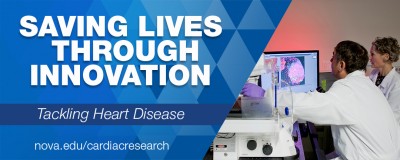NSU Newsroom
SharkBytes
Horizons
This version of NSU News has been archived as of February 28, 2019. To search through archived articles, visit nova.edu/search. To access the new version of NSU News, visit news.nova.edu.
This version of SharkBytes has been archived as of February 28, 2019. To search through archived articles, visit nova.edu/search. To access the new version of SharkBytes, visit sharkbytes.nova.edu.
NSU Research Spotlight: Innovative Cardiac Research
Scientists at the Nova Southeastern University Cell Therapy Institute and Sweden’s Karolinska Institutet are developing innovative treatments for life-threatening diseases through research in cancer immunotherapy and regenerative medicine.
Focusing on heart disease and cancer—two leading causes of death in the U.S. — the collaborative teams are developing ways to reprogram immune cells to target specific types of tumors, and the use of therapeutic stem cells to regenerate damaged heart tissue.
“The focus of our research is on diseases that are difficult to cure or impossible to cure,” said Richard Jove, Ph.D., director of the NSU Cell Therapy Institute and professor at the NSU Dr. Kiran C. Patel College of Allopathic Medicine (NSU MD). “Heart disease is the No. 1 killer in this country and this is where stem cells offer new hope.”
The research team is developing the use of therapeutic stem cells to regenerate damaged heart tissue following a heart attack. The goal is to save lives and eliminate or reduce the need for heart transplants in some patients.
“Stem cells offer very potent biological therapies and provide a way to regenerate the heart muscle. At NSU, my laboratory studies approaches that could make cells more therapeutically active,” said Vladimir Beljanski, Ph.D., assistant professor at NSU MD, who is leading the team.
Beljanski was one of 10 representatives from the institute and NSU MD who presented research at the 2018 World Stem Cell Summit in Miami in January.
“A key investment in the research here was focusing on stem cell therapies because we believe it is part of the future,” said Johannes W. Vieweg, M.D., FACS, founding dean of NSU MD. “Now we can repair damaged heart tissue with stem cells and we hope to expand that field into other areas.”
Pediatric Cancer
Although cancer in children is rare, it is the leading cause of death by disease among children in the U.S., according to the National Cancer Institute at the National Institutes of Health (NIH).
H. Thomas Temple, M.D., an orthopedic oncology surgeon at Hospital Corporation of America and senior vice president for translational research and economic development at NSU, is leading a global team that is developing the next generation of cancer therapies with an initial focus on pediatric sarcoma, a difficult cancer to treat.
Their mission is to reprogram the body’s immune cells, including natural killer (NK) cells, to target specific type of tumors. NK cells are a form of immunotherapy that is potentially less toxic and more effective in fighting tumor cells than standard cancer treatments, which rely upon chemotherapy and radiation.
“Natural killer cells are [part] of the major emphasis in tumor immunology,” said Evren Alici, M.D., Ph.D., a scientist at the Karolinska Institutet and visiting research professor at NSU MD.
The team’s research includes sarcoma tissue that is surgically removed from pediatric patients by Temple.
From there, scientists isolate individual tumor cells and send them to NSU’s other facilities for genetic sequencing, imaging, and further study. NSU is also using these cells to create an expanded tumor library to serve as a resource to researchers all over the world.
